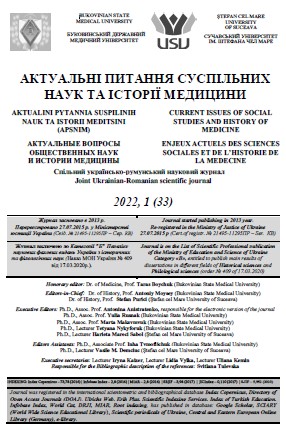ПОЗИЦІЙНІ ХАРАКТЕРИСТИКИ ВИРАЖЕННЯ ПРЕДМЕТНОЇ ЧАСТИНИ ЗМІСТУ АПЕЛЯЦІЇ В ПОЕТИЧНИХ ТВОРАХ ЛІНИ КОСТЕНКО
POSITIONAL CHARACTERISTICS OF THE SUBJECT PART’S EXPRESSION OF THE CONTENT OF THE APPEAL IN THE LINA KOSTENKO’S POETIC WORKS
Author(s): Marina KupchankoSubject(s): Ukrainian Literature, Theory of Literature
Published by: Видавництво ВДНЗ України « Буковинський державний медичний університет »
Keywords: sphere of appeal, independent (autonomous); pre-; inter-; post-appeals; one-word and multi-word nominations of the broadcast addressee;
Summary/Abstract: The purpose of the article is to establish the main positional characteristics of the expression of the nominations of the addressee of speech in the modern Ukrainian literary language. The relevance of the study is due to the fact that the positional characteristics of the expression of the nominations of the addressee of the speech have long been of interest to many Ukrainian linguists. The scientific novelty of intelligence is the introduction into scientific circulation of new factual material, clarification of the means of expression of the substantive part of the content of the appeal, development of classification of formal types of expression of nominations of the addressee in modern Ukrainian literary language. The practical significance of the work is that the results of the study can be used to describe identical or similar phenomena in other (primarily Slavic) languages, as well as in teaching courses in lexicology, morphology and syntax of the Ukrainian language. Conclusions. After studying the scientific material, we identified the following cases of using appeals: independent (autonomous), pre -, interand postposition. The main types of interposition of appeals, as evidenced by our factual material, are: position between sub ject and predicate, position between predicate and object, position before subject and predicate, position of appeals after object and predicate, position of appeals after predicate and object, the position of appeals after the subject and predicate. After analyzing the forms of appeal in prepositions, postpositions and interpositions in persuasive, interrogative and narrative sentences, w e came to the conclusion that appeals can be monosyllabic and verbose.
Journal: Актуальні питання суспільних наук та історії медицини
- Issue Year: 2022
- Issue No: 1
- Page Range: 74-78
- Page Count: 5
- Language: Ukrainian

